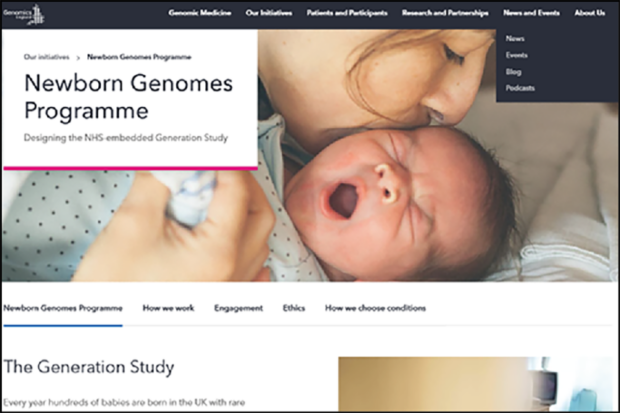
by Amanda Pichini, Clinical Director at Genomics England
Newborn screening has been a highly successful public health programme for decades, in the UK and worldwide. At the same time, many babies are born each year with other conditions that might, if detected earlier, be treated before symptoms develop. Such early detection might improve the health of these babies.
The advent of new technologies that allow us to analyse a baby’s genetic code (genomics) challenges us to consider whether such technologies could be used in existing screening programmes, or be the basis for new programmes.
Whole genome sequencing (WGS) was introduced in the NHS about a decade ago through the 100,000 Genomes Project and is now offered as a diagnostic tool for rare conditions in the NHS Genomic Medicine Service. WGS allows identification of many different genetic variants in a single test. So we want to know whether it offers a useful screening tool in babies to pick up a larger number of conditions that newborn screening does not currently look for.
The Generation Study aims to study 100,000 newborns with WGS, to help understand if such a test can help identify treatable conditions effectively. This research study is being run by Genomics England in partnership with the NHS in England. It has been designed with extensive consultation with the public, parents and families affected by rare conditions, as well as healthcare professionals, policymakers and scientists.
Study aims and format
The study aims to:
- look for variants linked to more than 200 genetic conditions so that these babies can be referred to clinical experts in the NHS in early childhood
- enable wider research in genomics and healthcare, including improving diagnostics and treatments for genetic conditions in the future
- explore whether and how storing an individual’s genome over their lifetime could support their healthcare. This will be explored primarily through engagement with participants and the public
Parents are invited to consider the study during pregnancy at participating NHS Trusts across England. If they make an informed decision to take part, then typically an umbilical cord sample is collected shortly after birth. We expect that most – around 99% of babies – will not have any of the gene variants associated with the conditions being explored in the study. For the 1% of babies found to have genetic variant(s) linked with a condition, the benefits could be significant.
Importantly, the Generation Study is a research study that runs alongside the existing NHS Newborn Blood Spot Screening Programme which is offered to all babies in the UK to test for 9 rare, but serious, conditions. The aim of the study is to gather evidence to inform future decisions about expanding newborn screening. Genomics England has worked with the NHS, the UK National Screening Committee (UK NSC) and evaluation experts to define important research questions about test performance, cost, feasibility, acceptability and impacts on families and the NHS. It will explore questions about the overall benefits and harms to families, health services and the public.
Addressing uncertainties
We know there is still much to learn about how many babies have a genetic variant predisposing to certain conditions, and how many of these babies will go on to develop the condition in question. We know from other research studies that some variants do not cause the condition in all people. Furthermore, we know that our understanding of genomes is skewed towards people of European ancestry, so it is important to research how newborn screening can be done effectively in babies with less studied ancestries.
Because of these uncertainties, Genomics England has worked with paediatric and genetic specialists to choose conditions carefully, and will not report variants for which they consider the evidence weak or uncertain. This is important so that parents are not left worrying about a condition which their baby will never go on to develop. Babies who test positive will be followed up in the NHS with other tests to confirm, or refute, the genetic findings.
As some of the 200-plus conditions are very rare, it is possible we will not diagnose some of them in the 100,000 babies recruited to the study. In order to better understand the link between genetic variants and health conditions the Generation Study is collecting information on all babies in the study. This is important to determine true positive and false negative rates.
Ultimately, the Generation Study hopes to provide evidence to support the prevention of ill health. While this comes with clinical, scientific, ethical and operational challenges, it also provides an opportunity to gather much needed evidence to inform future population screening approaches.
More information about the Generation Study can be found on Genomics England’s website.
Keep up to date
The UK NSC blog provides up to date news from the UK NSC. You can register to receive updates direct to your inbox, so there is no need to keep checking for new articles. If you have any questions about this blog article, or about the work of the UK NSC, please email uknsc@dhsc.gov.uk.